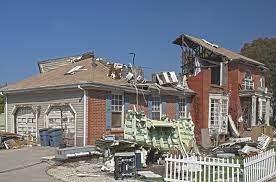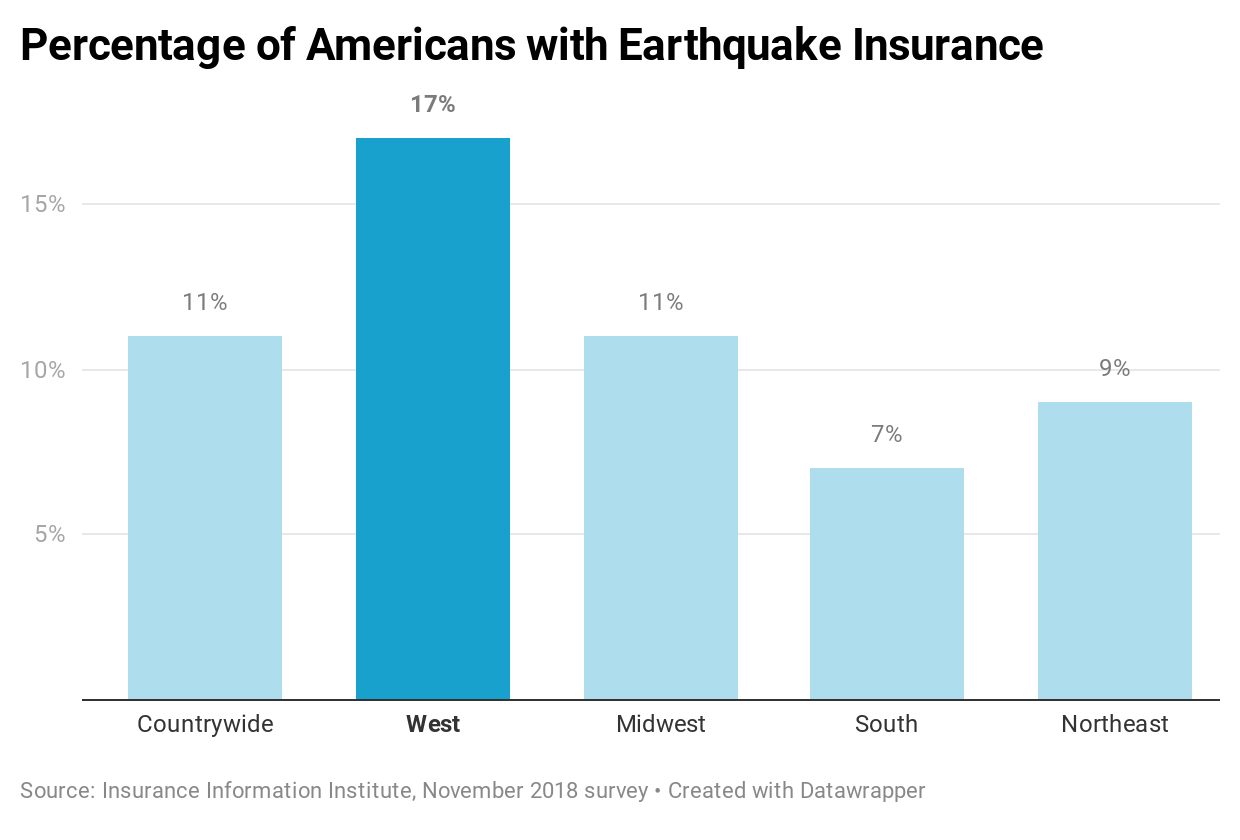

Earthquakes are natural disasters that can strike with little warning, leaving behind a trail of destruction. The violent shaking of the ground can cause significant damage to buildings, infrastructure, and personal belongings. In regions prone to seismic activity, earthquake insurance becomes a vital safeguard for homeowners and property owners.
Understanding Earthquake Insurance:
Earthquake insurance is a specialized type of coverage designed to protect against the financial losses caused by earthquakes. Unlike standard homeowners' insurance, which typically excludes earthquake damage, earthquake insurance provides specific coverage for damages resulting from seismic events.
What Does Earthquake Insurance Cover?
Earthquake insurance typically covers a range of damages, including:
Structural Damage: This includes repairs to the building's foundation, walls, roof, and other structural components that may be damaged during an earthquake.
Personal Belongings: Earthquake insurance can provide coverage for the loss or damage of personal possessions, such as furniture, appliances, electronics, and clothing.
Additional Living Expenses: In the event that the insured property becomes uninhabitable after an earthquake, earthquake insurance can help cover the cost of temporary housing and living expenses.
Other Structures: Detached garages, sheds, and other structures on the property may also be covered under earthquake insurance.
Customized Coverage: Depending on the policy, earthquake insurance can be tailored to individual needs, allowing for increased coverage limits or specialized protection.
Factors to Consider:
When considering earthquake insurance, there are essential factors to keep in mind:
Location: The likelihood of earthquakes varies by region. Areas located near fault lines or active tectonic plate boundaries are at higher risk and may have higher insurance premiums.
Deductibles: Earthquake insurance policies often come with higher deductibles than standard homeowners' insurance. Policyholders should carefully assess the deductible amount to ensure it aligns with their budget and risk tolerance.
Exclusions: Earthquake insurance policies may have certain exclusions, such as landslides or tsunamis caused by earthquakes. Policyholders should review the policy carefully and understand what is covered and what is not.
Cost and Coverage Limits: The cost of earthquake insurance can vary based on factors like location, home value, and desired coverage limits. It is essential to obtain quotes from different insurance providers to find the best coverage for the most reasonable cost.
Should You Get Earthquake Insurance?
Deciding whether to invest in earthquake insurance depends on various factors, including the seismic activity in your region, the value of your home and possessions, and your financial capacity to cover potential earthquake-related losses.
Mitigating Earthquake Risks: Preparedness and Safety Measures While earthquake insurance provides valuable financial protection, there are also proactive steps homeowners can take to mitigate the risks and enhance their preparedness for seismic events.

| Car Insurance |
| Homeowners Insurance |
| Life Insurance Plan |
| Commercial Insurance Brokers |
| Pet Insurance Plan |
| Renters Insurance Plan |
| Best Credit Cards |
| AAA Trip Interruption |
Home Safety Measures:
Bolting and Bracing: Securing the house to its foundation with bolts and braces can strengthen its structural integrity during an earthquake, reducing the risk of collapse.
Reinforced Foundations: Reinforcing the foundation and walls with materials like steel or fiber-reinforced polymers can increase the home's ability to withstand seismic forces.
Securing Furniture and Fixtures: Fastening heavy furniture, bookshelves, and appliances to walls can prevent them from toppling over during an earthquake, reducing potential hazards.
Automatic Gas Shut-Off Valve: Installing an automatic gas shut-off valve can help prevent gas leaks and reduce the risk of fire after an earthquake.
Non-Slip Floor Coverings: Using non-slip rugs and mats can prevent falls and injuries during the shaking of an earthquake.
Emergency Preparedness:
Family Emergency Plan: Creating a family emergency plan that includes designated meeting spots, contact information, and evacuation routes is crucial to ensure everyone's safety during and after an earthquake.
Emergency Supplies: Assembling an emergency kit with essentials such as water, non-perishable food, first aid supplies, flashlights, and blankets can sustain the family in the aftermath of a quake.
Know Safe Zones: Identify safe spots in each room, such as under sturdy furniture or against interior walls, where family members can take cover during the shaking.
Educate Family Members: Educate everyone in the household about earthquake safety, including the "Drop, Cover, and Hold On" technique during an earthquake.
Practice Drills: Regularly conducting earthquake drills with the family can help reinforce safety procedures and improve response times during an actual seismic event.
Community Resilience:
Engage with Local Authorities: Stay informed about earthquake risks in your area and participate in community preparedness efforts led by local authorities.
Support Building Retrofits: Advocate for building retrofits and seismic upgrades in your community to improve overall earthquake resilience.
Participate in Awareness Campaigns: Participate in earthquake preparedness campaigns to raise awareness among neighbors and foster a culture of safety.
Community Building and Earthquake Preparedness

| Car Insurance |
| Homeowners Insurance |
| Life Insurance Plan |
| Commercial Insurance Brokers |
| Pet Insurance Plan |
| Renters Insurance Plan |
| Best Credit Cards |
| AAA Trip Interruption |
Neighborhood Networks:
Encouraging neighborhood networks and communication channels can strengthen community bonds and facilitate the exchange of information during emergencies. Forming a neighborhood watch or disaster preparedness group allows residents to collaborate on earthquake preparedness strategies, share resources, and support one another during challenging times.
Public Education and Training:
Promoting public education and training on earthquake preparedness is crucial for empowering residents with the knowledge and skills to respond effectively during seismic events. Local authorities and organizations can organize workshops, drills, and seminars to disseminate essential information about earthquake safety measures.
Building Assessments and Retrofit Programs:
Communities should advocate for building assessments and retrofit programs to identify and address potential vulnerabilities in structures. Identifying at-risk buildings and implementing seismic retrofitting measures can significantly reduce property damage and enhance public safety.
Collaboration with Emergency Services:
Establishing strong communication and collaboration with emergency services is essential for swift and coordinated responses during and after earthquakes. Local authorities, fire departments, and rescue teams must be well-informed about the community's needs and resources to provide efficient assistance during emergencies.
Inclusive Planning:
Community leaders should ensure that earthquake preparedness efforts are inclusive and address the needs of vulnerable populations, such as the elderly, people with disabilities, and non-English speakers. Tailoring emergency plans to meet diverse needs ensures that everyone can effectively participate in earthquake preparedness.
Utilizing Technology:
Leveraging technology can enhance earthquake preparedness and response. Communities can utilize smartphone apps, social media, and alert systems to disseminate critical information quickly and efficiently.
Public-Private Partnerships:
Public-private partnerships can strengthen earthquake resilience by leveraging resources from both sectors. Businesses, schools, and healthcare facilities can collaborate with local authorities to develop joint preparedness plans and enhance community-wide response capabilities.
Community Emergency Response Teams (CERT):
Establishing Community Emergency Response Teams (CERT) empowers trained volunteers within the community to provide immediate assistance after an earthquake until professional responders arrive. CERT members can assist with search and rescue, first aid, and communication.
The Ripple Effect of Preparedness:
Investing in community earthquake preparedness has a far-reaching impact beyond individual households. A resilient community can minimize the strain on emergency services, expedite recovery efforts, and support neighbors in times of crisis. Moreover, earthquake preparedness initiatives can foster a culture of proactive safety and disaster readiness, leading to more resilient communities overall.
Earthquakes are natural disasters that can strike unexpectedly, causing extensive damage and financial losses. To safeguard against such risks, many insurance providers offer earthquake insurance as a specialized coverage option. Let's delve into some well-known earthquake insurance providers, coverage details, and factors influencing the cost of earthquake insurance.
Liberty Mutual Earthquake Insurance:
Liberty Mutual is among the reputable insurers offering earthquake insurance. Their coverage typically includes protection for the structure of the insured property, personal belongings, and additional living expenses if the property becomes uninhabitable due to an earthquake.
Farmers Earthquake Insurance:
Farmers Insurance provides earthquake insurance to homeowners seeking financial protection against seismic events. Coverage often includes repairs or replacement of damaged structures and personal possessions, as well as assistance with temporary living arrangements during necessary repairs.
AAA Earthquake Insurance:
AAA, a widely recognized insurance provider, offers earthquake insurance to its policyholders. AAA's coverage options may include dwelling coverage, personal property coverage, and additional living expenses coverage after an earthquake.
Travelers Earthquake Insurance:
Travelers Insurance offers earthquake insurance as an add-on to their homeowners' insurance policies. This additional coverage can help policyholders protect their homes and personal belongings in the event of an earthquake.
Allstate Earthquake Insurance:
Allstate provides earthquake insurance to homeowners looking for added financial protection. Their coverage options often encompass repairs to the structure, replacement of personal belongings, and assistance with temporary housing if needed.
Foremost Earthquake Insurance:
Foremost Insurance specializes in providing earthquake insurance for mobile and manufactured homes. Their coverage typically includes protection against structural damage and personal property losses.
Homesite Earthquake Insurance:
Homesite Insurance offers earthquake insurance to homeowners, covering expenses related to structural damages, belongings, and temporary accommodations.
USAA Earthquake Insurance:
USAA offers earthquake insurance to its members, including coverage for dwelling protection, personal property, and additional living expenses resulting from an earthquake.
Factors Influencing Earthquake Insurance Costs:
Several factors affect the cost of earthquake insurance:
Location: Properties located in high-risk seismic zones or earthquake-prone regions may have higher insurance premiums due to increased exposure to seismic activity.
Deductible: Policyholders can choose their deductible amount, and higher deductibles often lead to lower premiums, but may require a higher out-of-pocket cost in the event of a claim.
Home Value: The value of the insured property directly impacts the coverage amount and, consequently, the insurance cost.
Building Type: The construction type and materials used in the insured property can influence the potential for damage during an earthquake and affect insurance premiums.
Coverage Limits: Higher coverage limits will result in higher insurance costs, but it ensures greater protection in case of significant damage.

| Car Insurance |
| Homeowners Insurance |
| Life Insurance Plan |
| Commercial Insurance Brokers |
| Pet Insurance Plan |
| Renters Insurance Plan |
| Best Credit Cards |
| AAA Trip Interruption |
Q: What is earthquake insurance?
A: Earthquake insurance is a specialized insurance policy that provides coverage for damages and losses caused by earthquakes. Unlike standard homeowners' insurance, earthquake insurance specifically protects against seismic events.
Q: What does earthquake insurance cover?
A: Earthquake insurance typically covers damages to the insured property's structure, personal belongings, additional living expenses, and other structures on the property, all resulting from an earthquake.
Q: Is earthquake insurance mandatory?
A: Earthquake insurance is not typically mandatory. However, it is highly recommended for homeowners and property owners in regions prone to seismic activity to protect against potential financial losses.
Q: How much does earthquake insurance cost?
A: The cost of earthquake insurance varies based on factors such as location, property value, construction type, deductible amount, and desired coverage limits. Generally, premiums can range from a few hundred to a few thousand dollars per year.
Q: Is earthquake insurance included in standard homeowners' insurance?
A: No, earthquake insurance is usually not included in standard homeowners' insurance policies. Homeowners must purchase a separate earthquake insurance policy or endorsement to add coverage for seismic events.
Q: What regions are most at risk for earthquakes?
A: Earthquake risks are higher in regions located near tectonic plate boundaries and fault lines. Some areas with increased seismic activity include the West Coast of the United States, Japan, Indonesia, and parts of South America.
Q: What is the waiting period for earthquake insurance coverage?
A: Earthquake insurance policies often have a waiting period before coverage takes effect. Waiting periods can range from a few days to several weeks after the policy's purchase or renewal date.
Q: Are there any exclusions in earthquake insurance coverage?
A: Yes, earthquake insurance may have exclusions, such as damages caused by landslides, tsunamis, or other events not directly resulting from seismic shaking. Policyholders should carefully review their policy to understand the specific exclusions.
Q: Can renters get earthquake insurance?
A: Yes, renters can purchase earthquake insurance to protect their personal belongings and provide additional living expenses if their rented property becomes uninhabitable after an earthquake.
Q: How do I know if I need earthquake insurance?
A: Homeowners and property owners in earthquake-prone regions should consider factors such as the seismic activity in their area, the value of their property and belongings, and their ability to financially recover from earthquake-related losses when deciding whether to get earthquake insurance.
Q: What is the meaning of earthquake insurance?
A:Earthquake insurance is a form of property insurance that pays the policyholder in the event of an earthquake that causes damage to the property. Most ordinary homeowners insurance policies do not cover earthquake damage.
Q: Is earthquake covered by insurance?
A:Damage caused to the property, both internally and externally, by an earthquake is covered
Q: Does fire insurance cover earthquake?
A:Unfortunately, earthquake damage is not covered under a standard fire insurance policy, even though a major earthquake can cause significant harm to the insured's property or goods
Q: What is natural disaster in insurance?
A: Comprehensive Home Insurance Plan:This policy apart from covers risks posed by natural disasters such as flood, earthquake, lighting, inundation, storm in addition to Fire, riots, strikes etc.
Q: What is theft insurance?
A: Theft-insurance contracts cover losses from burglary, robbery, and other theft. Aviation insurance usually covers physical damage to the aircraft and legal liability arising out of its ownership and operation.
Q: Is earthquake a peril?
A:Earthquake is a peril that is not normally included in any type of home insurance policy. Earthquake coverage may be purchased separately as an add-on to your policy, and it is subject to a higher deductible than coverage for other perils.
Q: What does a life insurance cover?
A: Life insurance policy benefits can be used to help pay for final expenses after you pass away. This may include funeral or cremation costs, medical bills not covered by health insurance, estate settlement costs and other unpaid obligations.
Q: Is an earthquake a fault?
A: A normal (dip-slip) fault is an inclined fracture where the rock mass above an inclined fault moves down (Public domain.) An earthquake is what happens when two blocks of the earth suddenly slip past one another. The surface where they slip is called the fault or fault plane.

| Car Insurance |
| Homeowners Insurance |
| Life Insurance Plan |
| Commercial Insurance Brokers |
| Pet Insurance Plan |
| Renters Insurance Plan |
| Best Credit Cards |
| AAA Trip Interruption |
© Insurance Life Plan. All Rights Reserved. POWERD BY ![]()